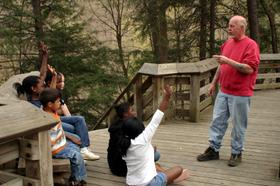To provide students with academic, social, and personal enrichment opportunities year-round, many public schools and national institutions have created unique and diverse summer programs. With programs focusing on core subject areas, such as math and language, in addition to programs that spotlight team development and leadership skills, students of all ages can benefit from the exclusive perks of summer programs.
Stimulate Academic Advancement and Cognitive Development
For students who struggle in specific academic areas, or for students who demonstrate exceptional academic abilities in core areas, summer programs that focus on academic instruction allow students to enhance their cognitive skills and abilities. For example, as the American Mathematical Society reveals in their list of summer camps and programs, there are hundreds of local universities, public schools, and community colleges that provide kids with the opportunity to engage in mathematical practice, research, and investigations.
While these opportunities, in any subject area, will provide students with unique and engaging intervention activities and lessons, many of the academic programs also help support personal development and social development advancements as well.
In this video, Socratica offers 5 reasons for attending summer school.
For example, in thoroughly investigating the array of summer math programs across the country, the University of Nebraska-Lincoln (UNL) directs an academically rigorous math camp with a unique social twist; the UNL camp caters specifically to young girls ranging from grades 10 through 12. Striving to target this unique group of students who specifically tend to struggle in math, and who simultaneously often demonstrate negative attitudes towards math, the UNL “ALL Girls Math” camp allows teenage girls to interact with one another, learn and enhance their mathematical skills while finding out more about the various professional opportunities that are available for students who study math in high school and college.
The girls are provided with problem-solving opportunities each day, and they finish off their camp experience by meeting a professional and renowned female-mathematician guest speaker. As evident with “All Girls Math,” there are an array of unique academic summer programs to provide students with diverse needs and interests with specific, targeted, and engaging summer programs to enhance academic and personal growth.
Promote Social Development and Personal Growth
Regardless of a camp’s focus, whether it is academic, leadership-based, or sports-based, a secondary benefit of summer programs is the opportunity for kids to develop socially. As most summer programs cater to a larger array of student populations, many kids are able to interact with peers with different backgrounds, experiences, and personalities. This opens a child’s mind to the awareness of his or her world. In addition, these unique experiences help a child more effectively learn the tools and skills of effective communication, cooperation, and interaction.
As Focus Adolescent Services (FAS) explains in their focus on summer programs, kids engaging in summer programs are able to improve their social skills through organized activities, games, and adult guidance. As FAS asserts, “Through these goals, camp participants can learn social skills, become more socially comfortable, more open to trying new things, learn empathy and cooperation, and different ways of responding to new and challenging situations.” Students in academic programs, for example, are often partnered up with a peer to work on problem-solving and research assignments. Conversely, students in sports-based programs are required to establish effective strategies for teamwork, communication, and coordinated planning.
In this video, students talk about the benefits of summer school.
Without these opportunities and unique social exposures, many students may become introverted and increasingly shy. Unique summer programs can help prevent issues of introversion, while they can also help students to gain experiences and skills that help boost confidence and positive social assertiveness.
Encourage Physical Activity and Routines
Even in cases of students who appear to be seemingly unmotivated and lazy, there is a point during every child’s summer break where, if left un-stimulated and without interaction, a child will become bored, irritated, and may even eventually exhibit signs of depression.
To actively prevent these emotional and behavioral issues, parents can take advantage of summer programs to force kids to get moving! Obviously, if a child is enrolled in an athletic-based summer program, he or she will be forced to engage in rigorous physical activities, which can boost positive feelings with a surge of hormones and chemicals produced from exercise. This video from Maple P.E. illustrates the benefit of exercise in summer school.
Yet even in programs that are not athletically or outdoor-based, summer programs of any nature force kids to get up, turn off their television or computer, and get out of the house. The simple act of providing a child with routines and entertaining activities can help prevent an array of behavioral struggles and emotional downfalls that often occur over the summer months when children are faced with boredom and a lack of routine.
Questions? Contact us on Facebook. @publicschoolreview













